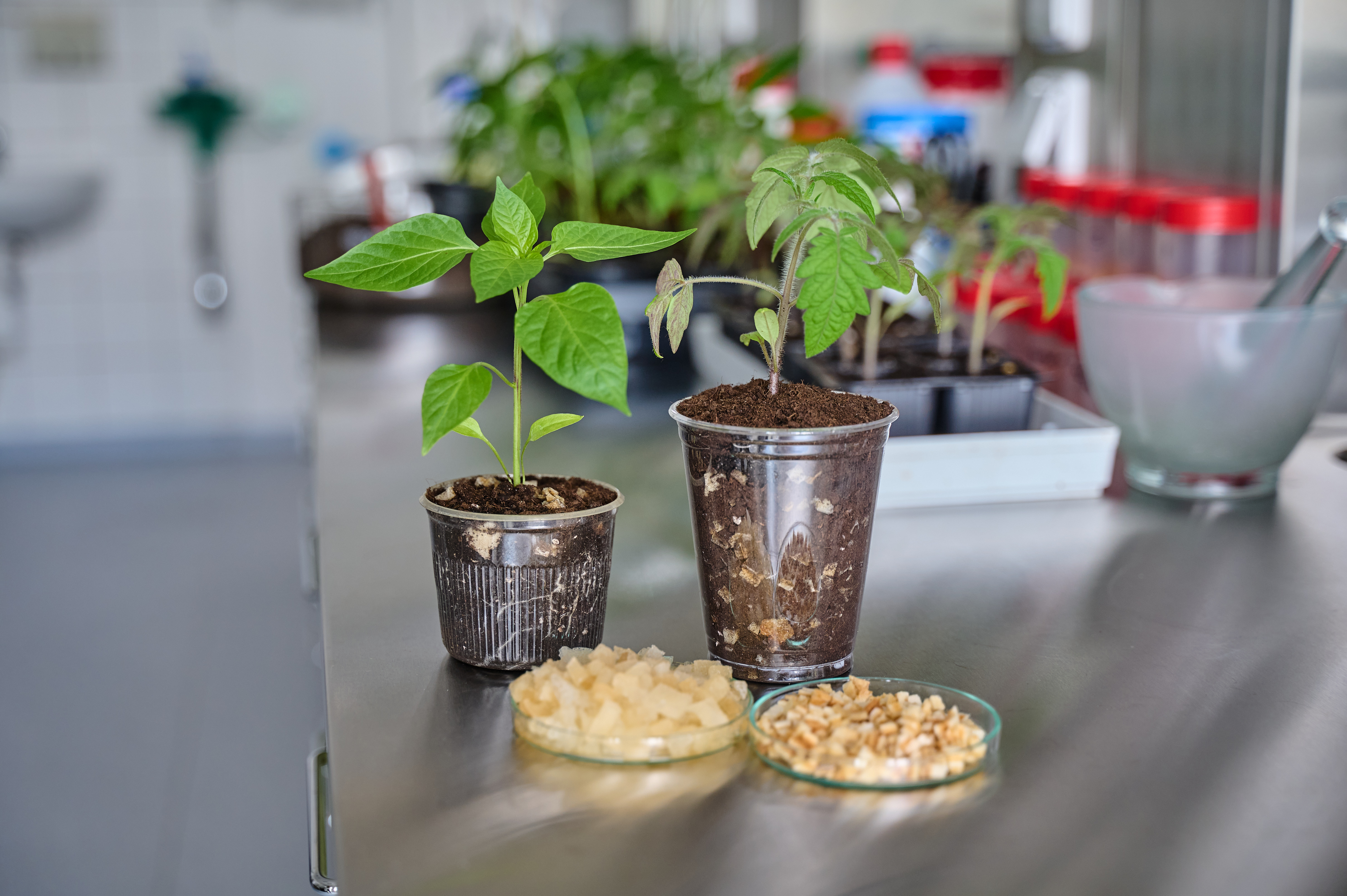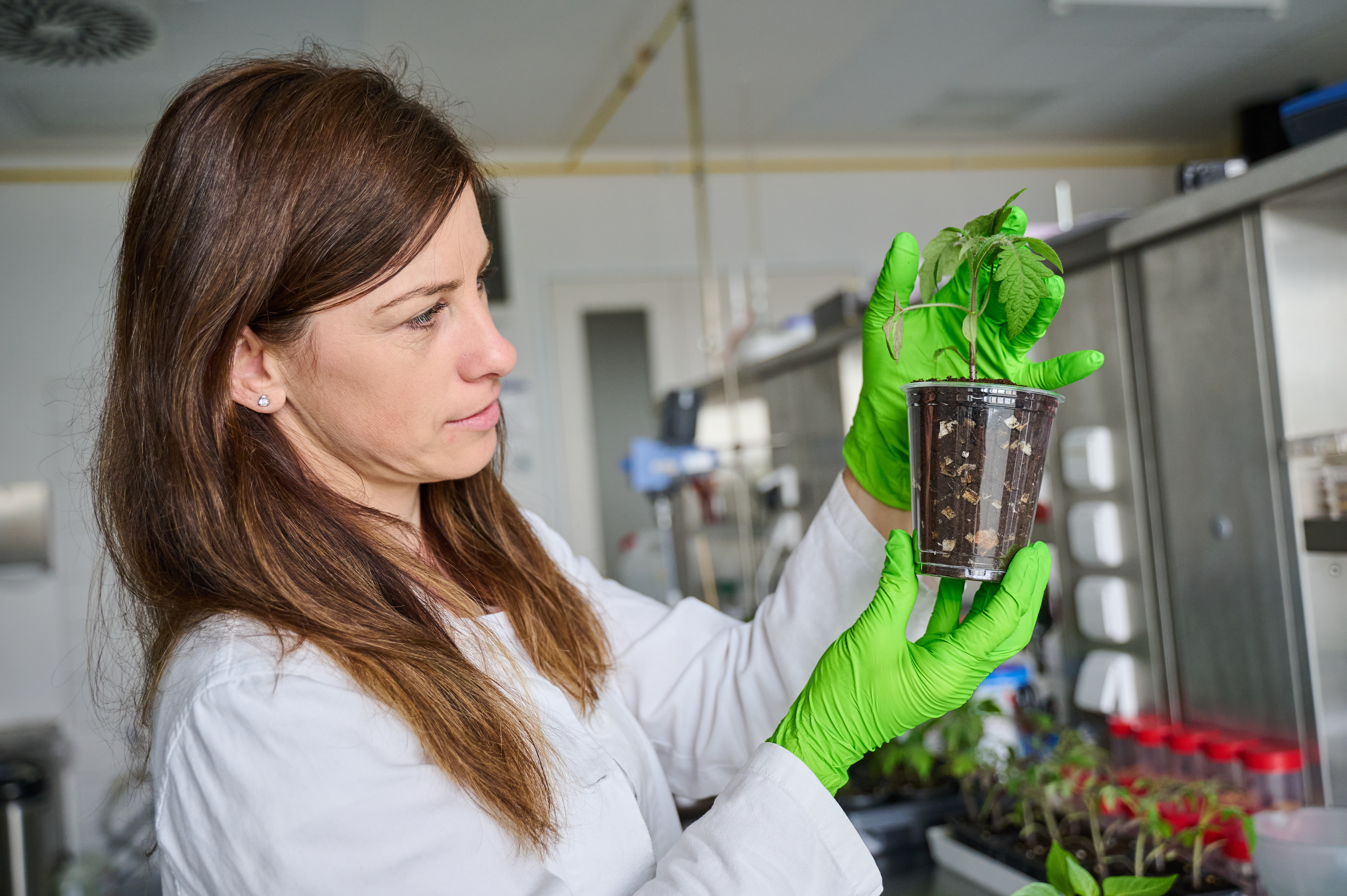ECO-FRIENDLY WHEY HYDROGELS HELP FIGHT DROUGHT
Zlín, on 29 June 2022 – How to help retain water in the landscape, increase soil retention capacity and reduce the negative impacts of drought on agriculture? Researchers from the Centre for Polymer Systems (CPS) at the university in Zlín have addressed this topic in cooperation with the Czech Research Institute of Dairy Industry, LACRUM Velké Meziříčí and the Czech Research Institute for Soil and Water Conservation.
Drought in the countryside has become an increasingly discussed problem in recent years, as it affects especially important agricultural regions of the Czech Republic. Hydrogels are the very type of promising materials that are growing in popularity in agriculture. “Hydrogels improve soil quality through their capacity to capture rainwater or irrigation water and make it available to plants again in times of drought. In addition, they influence the soil structure, support microbiological activity in the soil and improve soil quality, plus they stimulate plant growth,” explains project co-investigator Silvie Duřpeková. Commercial hydrogels are already available on the market, mostly based on petroleum products whose biodegradability and safety are questionable.
“That is why our research group is dedicated to developing eco-friendly hydrogels that are made from purely natural, fully degradable, readily available and low-cost raw materials that do not pollute the environment. Their use will therefore bring both environmental and economic benefits,” describes prof. Vladimír Sedlařík, the supervisor of the Environmental Technologies Research Group that manages this project. Acid whey is the key component of the hydrogel; it is currently difficult to use in terms of value for money. Whey is a by-product of making fresh cheese and curd. It is estimated that almost 50% of the whey produced is not used and is a burden on the environment due to the difficulty of disposal. “The use of acid whey for the production of hydrogels can minimise waste and at the same time help to increase the availability of nutrients in the soil for plants, thanks to the high mineral content of whey,” adds Silvie Duřpeková. Drought has relatively wide negative effects on soil quality. The most common ones include the reduction of the retention capacity of agricultural land and its production capacity, as well as the loss of biodiversity as well as the susceptibility of soil to compaction.
According to current research, soil retention capacity in the Czech Republic has decreased by approximately 40% since 1950. Soil degradation due to drought also makes soils highly susceptible to subsequent water or wind erosion. The options for addressing this problem lie not only in a comprehensive approach to soil and water resource management but also in the use of materials and technologies that support the maintenance and restoration of soil quality. By mixing whey and cellulose derivatives, a solid gel is formed and converted, using other specific natural and non-toxic substances and subsequent drying stages, into a hydrogel with a stable 3D cross-linked structure. After application and contact with water, the hydrogel can hold and retain many times more water compared with its initial weight and gradually release the water in the event of a shortage. The hydrogel can bind water repeatedly, i.e. after drying it can re-absorb water and make it available to plants again in the dry season.
“Thanks to this property, we are also trying to enrich the hydrogels with other organic substances necessary for plant growth – such as fertilizers which would be gradually released into the soil and ensure the supply of nutrients to the plants over a longer period,” adds Silvie Duřpeková. “To verify the effectiveness of hydrogel and its applicability in agriculture, our laboratories test its physicochemical properties, its capacity to absorb and re-absorb water under various conditions, the retention capacity of hydrogel in the soil including the ability to gradually release fertilizers into the soil, its degradation in the soil environment and last but not least, the effects of hydrogel application on the growth of selected plants are also evaluated,” says prof. Vladimír Sedlařík. Under real-life circumstances, hydrogels are very easy to use. They can be prepared in the form of powder, crystals or granules, which are applied to the soil – before sowing – by spreading or ploughing to a depth of approximately 20 cm.
The product can also be used in gardening or your own garden when planting vegetable seedlings, flowers or trees when a small amount of hydrogel is added directly to the root ball of the plants or mixed with the growing medium into which the plants are subsequently planted. The results to date show that the application of whey hydrogel can help to increase soil retention capacity by 30–40% and retain rainwater or irrigation water in the soil up to 50% longer compared to soil without hydrogel. The hydrogel also has a positive effect on plant growth, especially in case of water shortage. In the field, these promising positive features can help to manage natural resources sustainably, use waste more efficiently and improve soil quality. The preparation of whey hydrogels is in the final stages of development; they are currently being tested for their effectiveness and trials are already underway directly in the fields in cooperation with the Research Institute for Soil and Water Conservation. The project will be completed in 2023.


Drought in the countryside has become an increasingly discussed problem in recent years, as it affects especially important agricultural regions of the Czech Republic. Hydrogels are the very type of promising materials that are growing in popularity in agriculture. “Hydrogels improve soil quality through their capacity to capture rainwater or irrigation water and make it available to plants again in times of drought. In addition, they influence the soil structure, support microbiological activity in the soil and improve soil quality, plus they stimulate plant growth,” explains project co-investigator Silvie Duřpeková. Commercial hydrogels are already available on the market, mostly based on petroleum products whose biodegradability and safety are questionable.
“That is why our research group is dedicated to developing eco-friendly hydrogels that are made from purely natural, fully degradable, readily available and low-cost raw materials that do not pollute the environment. Their use will therefore bring both environmental and economic benefits,” describes prof. Vladimír Sedlařík, the supervisor of the Environmental Technologies Research Group that manages this project. Acid whey is the key component of the hydrogel; it is currently difficult to use in terms of value for money. Whey is a by-product of making fresh cheese and curd. It is estimated that almost 50% of the whey produced is not used and is a burden on the environment due to the difficulty of disposal. “The use of acid whey for the production of hydrogels can minimise waste and at the same time help to increase the availability of nutrients in the soil for plants, thanks to the high mineral content of whey,” adds Silvie Duřpeková. Drought has relatively wide negative effects on soil quality. The most common ones include the reduction of the retention capacity of agricultural land and its production capacity, as well as the loss of biodiversity as well as the susceptibility of soil to compaction.
According to current research, soil retention capacity in the Czech Republic has decreased by approximately 40% since 1950. Soil degradation due to drought also makes soils highly susceptible to subsequent water or wind erosion. The options for addressing this problem lie not only in a comprehensive approach to soil and water resource management but also in the use of materials and technologies that support the maintenance and restoration of soil quality. By mixing whey and cellulose derivatives, a solid gel is formed and converted, using other specific natural and non-toxic substances and subsequent drying stages, into a hydrogel with a stable 3D cross-linked structure. After application and contact with water, the hydrogel can hold and retain many times more water compared with its initial weight and gradually release the water in the event of a shortage. The hydrogel can bind water repeatedly, i.e. after drying it can re-absorb water and make it available to plants again in the dry season.
“Thanks to this property, we are also trying to enrich the hydrogels with other organic substances necessary for plant growth – such as fertilizers which would be gradually released into the soil and ensure the supply of nutrients to the plants over a longer period,” adds Silvie Duřpeková. “To verify the effectiveness of hydrogel and its applicability in agriculture, our laboratories test its physicochemical properties, its capacity to absorb and re-absorb water under various conditions, the retention capacity of hydrogel in the soil including the ability to gradually release fertilizers into the soil, its degradation in the soil environment and last but not least, the effects of hydrogel application on the growth of selected plants are also evaluated,” says prof. Vladimír Sedlařík. Under real-life circumstances, hydrogels are very easy to use. They can be prepared in the form of powder, crystals or granules, which are applied to the soil – before sowing – by spreading or ploughing to a depth of approximately 20 cm.
The product can also be used in gardening or your own garden when planting vegetable seedlings, flowers or trees when a small amount of hydrogel is added directly to the root ball of the plants or mixed with the growing medium into which the plants are subsequently planted. The results to date show that the application of whey hydrogel can help to increase soil retention capacity by 30–40% and retain rainwater or irrigation water in the soil up to 50% longer compared to soil without hydrogel. The hydrogel also has a positive effect on plant growth, especially in case of water shortage. In the field, these promising positive features can help to manage natural resources sustainably, use waste more efficiently and improve soil quality. The preparation of whey hydrogels is in the final stages of development; they are currently being tested for their effectiveness and trials are already underway directly in the fields in cooperation with the Research Institute for Soil and Water Conservation. The project will be completed in 2023.




